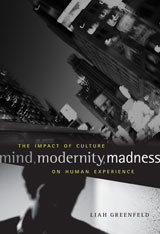
Mind, Modernity, Madness: The Impact of Culture on Human Experience by Liah Greenfeld, published in 2013 by Harvard University Press, is not merely an academic discourse; it is a journey into the depths of human experience, a narrative that challenges existing perceptions, believes and enriches our understanding of the individual’s identity in the modern world. Greenfeld’s book takes us on a path through the complexities of culture, mental health, and the modern world. She boldly asserts that culture profoundly shapes who we are as humans and defines our experiences. The central idea is that the symbolic framework of our time, such as nationalism and societal changes, do impact major mental disabilities such as schizophrenia, bipolar disorder, and major depressive disorders.
This book is a culmination of Greenfeld’s trilogy of nationalism, and it’s a blend of history, sociology, philosophy, psychology, psychiatry, and neuroscience. She’s exploring what makes us who we are, especially in terms of how culture impacts our mental well-being. Her exploration is not just academic milestones; it’s personal and imaginative. She’s motivated by her observations of depression among her young students, and she dives deep into cultural history to create a coherent narrative that resonates with our experiences.
At the core of Greenfeld’s exploration lies the foundation of modern nationalism – the principles of popular sovereignty, equality, and secularism. Greenfeld starts by looking at nationalism, which she defines as a form of consciousness, a way of thinking that emphasizes fundamental equality among community members and the power of communities to make their laws. This philosophy downplays the importance of divine forces and elevates human life and choices. It empowers individuals but also places tremendous stress on them, leading to issues like their place in the societal landscape. Greenfeld’s assertion that the empowerment of individuals, as equal and free beings in the context of modern nationalism, has a profound impact on mental health which introduces a paradigm shift in our understanding of psychological well-being. As she explores the ramifications of societal pressures for self-realization, a new perspective emerges, one where mental illnesses are not merely medical conditions, but reflections of the psychological tension between individual aspirations and societal expectations. This conceptual leap is nothing short of transformative, prompting readers to rethink how they perceive mental health within the fabric of societal constructs. In this era of empowerment, we’re pushed to constantly evaluate ourselves, manage our desires, and compare ourselves to others. This societal pressure, according to Greenfeld, is closely tied to mental illnesses. She argues that conditions like schizophrenia, bipolar disorder, and depression stem not just from biology but from the stress of trying to balance our individual goals with societal expectations.
One of the key insights of this book is that mental health isn’t just about biology; it’s about how culture and society influence our well-being. Greenfeld delves into philosophy, psychology, and history to create a rich understanding of mental health that goes beyond a simple medical perspective. She believes that cultural, psychological, and biological factors are all intertwined and should be considered together when we talk about mental health.
This book is divided into three main sections. In the first section, Greenfeld examines the philosophical foundations of science and the idea that our understanding of reality is shaped by social influences. She asserted how the mind emerges from complex interactions, setting the stage for her analysis of mental disorders. She also used the Durkheim concept of how suicide is not a personal but a result of a social act. The second section focuses on specific disorders – schizophrenia and bipolar disorder. She links these disorders to the loss of self and the dissolution of will, tying them to our cultural values of self-realization. Finally, she travels to history, to explore how mental disorders have been understood and treated over time.
Greenfeld’s argument challenges conventional views. For instance, she suggests that what we now consider mental illnesses were not the same in the past. She believes that the values of equality and self-realization in the sixteenth century led to the emergence of new kinds of mental distress, like psychosis. This perspective adds a layer of complexity to our understanding of mental health.
While her argument is compelling, readers may have questions about certain claims. For instance, she proposes that we’ll never find neurobiological explanations for severe psychiatric illnesses like schizophrenia. She emphasizes that these disorders exist at the level of culture and mind, not just biology. This viewpoint might challenge some widely accepted ideas.
However in summary Mind, Modernity, Madness: The Impact of Culture on Human Experience is an engaging and thought-provoking book that explores the intricate connections between culture, mental health, and our understanding of self. Greenfeld’s insights challenge us to look beyond traditional explanations and consider the role of culture in shaping mental disorders. This book invites us to think critically about how society, culture, and individual experiences intersect to influence our mental well-being. It’s a significant contribution to the discussion about mental health that encourages us to broaden our perspectives and explore new avenues of understanding.
***
Monika is a research scholar at the Indian Institute of Technology (IIT) Indore and a visiting research scholar at Boston University Massachusetts, USA. She has a post-graduation in Politics with a specialization in International relations from Jawaharlal Nehru University (JNU), New Delhi and a graduation in Political science from Ramjas College,University of Delhi.
[…] post Mind, Modernity, Madness: The Impact of Culture on Human Experience by Liah Greenfeld (2013): A Revi… appeared first on Doing […]